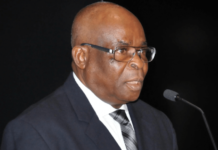 Professor Mahmood Yakubu:Osun governorship election not the first inconclusive election to be conducted by INEC
Professor Mahmood Yakubu:Osun governorship election not the first inconclusive election to be conducted by INEC
The Osun governorship election was not the first to be declared inconclusive by the Independent National Electoral Commission (INEC).
There had been several others before it, including governorship elections, contrary to insinuations in some quarters that what INEC’s returning officer, Professor Joseph Fuwape, Vice chancellor Federal University of Technology, Akure, did was unprecedented.
Anambra 2011
The late Dora Akunyili, contesting for the Anambra Central Senatorial seat in 2011, on the platform of APGA, was in the lead with 66,273 votes. Her opponent, Chris Ngige, of the then Action Congress of Nigeria (ACN) was trailing with 65,576 votes, when the election was declared inconclusive.
According to the returning officer, Charles Esimole, voting had been cancelled in several wards of the senatorial district, and the number of registered voters in those wards was higher than the 697 votes difference between Akunyili and Ngige.
Eventually, Ngige won the re-run election with a total of 69,725 votes to Akunyili’s 69,236 votes.
Anambra 2013
(adsbygoogle = window.adsbygoogle || []).push({});
The Anambra governorship election of 2013 was declared inconclusive notwithstanding that Willie Obiano, candidate of the All Progressives Grand Alliance (APGA), had taken a huge lead with 174,710 votes. His closest challenger, Tony Nwoye of the PDP, had polled a total of 94,956.
As it stood, Obiano’s votes was higher that of Nwoye’s with 79,754 votes, but the number of votes that was cancelled in about 15 local government areas of the state totalled 113,113, higher than the number of votes Obiano was leading with. As a result, the returning officer, James Epoke, then Vice-Chancellor of the University of Calabar, declared the election inconclusive, to allow for a supplementary election in the places where voting was cancelled. Obiano went on to win the election.
Bayelsa 2015
With Seriake Dickson of the PDP leading the polls with 105,748 votes, and Timipre Sylva of the APC trailing with 72,594, INEC declared the 2015 Bayelsa governorship election inconclusive.
Dickson had won the election in six out of the seven local government areas in the state, and Sylva had won just one LGA, but the election was declared inconclusive following the cancellation of the entire votes in Southern Ijaw LGA as a result of massive electoral malpractice and violence.
The number of registered voters in Southern Ijaw LGA was put at 120,000, which was above the difference between Dickson and Sylva’s total votes.
Dickson went ahead to win the election.
Kogi 2015
Abubakar Audu, candidate of the APC in the November 2015 Kogi governorship election, was already coasting home to victory with 240,867 votes. The PDP’s candidate and incumbent Governor at the time, Idris Wada, was trailing with 199,514 votes. But the number of cancelled votes was 49,953, higher than Audu’s victory margin of 41,353 votes.
(adsbygoogle = window.adsbygoogle || []).push({});
Hence the returning officer, Emmanuel Kucha, declared the election inconclusive.
Unfortunately, Audu, the leading candidate, died of heart attack, that same evening, but Yahaya Bello, who had come second in the APC governorship primary, was tapped to complete the race on Audu’s behalf. He (Bello) was later declared winner.
Imo 2015
The 2015 governorship election in Imo State was also declared inconclusive as a result of vote cancellations due to electoral malpractices.
At the time, Rochas Okorocha, who was running on the platform of APC, was leading PDP’s Emeka Ihedioha with 385,671 votes to 306,142, a margin of 79,529 votes.
However, votes that had been cancelled in several polling units across the state totalled 144,715, leaving the returning officer, Ibidapo Obe, no choice but to declare the election inconclusive.
Osun 2018 election:
Ademola Adeleke, governorship candidate of the Peoples Democratic Party (PDP), got the highest votes of 254,698. Candidate of the All Progressives Congress (APC), Gboyega Oyetola, came close with 254,345 votes.
(adsbygoogle = window.adsbygoogle || []).push({});
However, the total number of registered voters in the five polling units where elections were cancelled is 3,498 votes, higher than the 353 votes’ difference between Adeleke and Oyetola, hence the need to have a re-run election.
While many, especially supporters of the PDP, have been crying foul and insisting that INEC should declare Adeleke winner of the election, others have applauded the returning officer of the election, Joseph Fuwape, for demonstrating commendable courage to do the right thing.
What the law says
Section 53 (2) of the electoral act stipulates that “where the votes cast at an election in any polling unit exceed the number of registered voters in that polling unit, the result of the election for that polling unit shall be declared void by the Commission and another election may be conducted at a date to be fixed by the Commission where the result at that polling unit may affect the overall result in the Constituency.”
Section 53 (3) added thus: “Where an election is nullified in accordance with subsection (2) of this section, there shall be no return for the election until another poll has taken place in the affected area.” (NAN)











